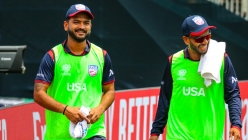India gets a wake up call - Suresh Menon
2009 Nov 09 by Suresh Menon
History has shown that victory often makes the Indian team complacent, with a fawning media aiding the authorities to push all weaknesses under the carpet.
By Suresh Menon
The World Cup is just 14 months away, and suddenly India look vulnerable and under-prepared. Yet, if they learn the right lessons from the defeat to Australia, it might just be the wake up call the team needs to get its act together. History has shown that victory often makes the Indian team complacent, with a fawning media aiding the authorities to push all weaknesses under the carpet.
Injuries to key players forced the Australian team to try out new combinations. Only one thing was constant – the commitment to fielding. Every player, from the veteran Ricky Ponting to the greenhorn just off the aircraft threw body and soul into chasing the ball, saving runs and attempting improbable catches.
If India continue to pretend that fielding is not important, they would have refused to learn from their mistakes. Injury might have aided Australia’s preparations for the World Cup – they now know their bench strength. Defeat can play the same role for India if they are willing to take strong decisions and the coach lays down the law without fear or favour.
First, the fielding. In the team which lost the Guwahati match, India had only one player above average in that department – Suresh Raina. The rest were either adequate (Tendulkar, Gambhir, Yuvraj, Jadeja) or below it (Praveen, Munaf, Nehra, Harbhajan, Sehwag). On a good day, Harbhajan and Sehwag might field well enough to be adequate, but no team can afford the lack of anticipation, pace, pick-up and throw of Praveen, Munaf and Nehra.
Is it time to lay down a minimum qualification fielding standard for entry into the Indian team? And to keep a player out for his lack of fielding ability regardless of his batting or bowling prowess?
In some ways, Praveen Kumar was a revelation. The ball leaves his bat with a speed and certainty that suggests a natural sense of timing, and when he gets his footwork right, he can loft over the boundary with an ease that would do credit to a Sehwag. Yet, his fielding has been consistently below par. His running between wickets is disastrous. However good a Munaf Patel or an Ashish Nehra is, does the effectiveness of their primary job overcome the negatives of their fielding?
When the Indian batting is in full flow, there is no sight more exciting. Yet questions will have to be asked about one of their finest, Virender Sehwag, whose approach to the one-day game lacks the intelligence he shows in the longer version. Over the years, he has been allowed a certain margin of irresponsibility – rather like pregnant women - such is his phenomenal record in Tests. Sehwag will obviously be a key member of the 2011 squad, but the coach must withdraw the license to irresponsibility that he has.
What is India’s bench strength? Would they have been able to send out half a dozen players as replacement to Australia and return with a series victory? Who is the second best off spinner in the country? Or the sixth best medium pacer?
There is nothing like playing matches in preparation for the World Cup. But it is important not to invite injury and staleness by overdoing them. One solution would be to pick a pool of 20 or 25 players and rotate them to ensure that everybody gets adequate rest. No single series between now and February 2011 is as important as the World Cup, and any incidental defeat in pursuit of team balance should be seen from that perspective. And if hard decisions have to be taken, then so be it.




